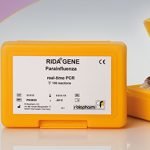Community-acquired pneumonia (CAP) is the most common fatal infectious disease in western countries. Bacteria are the most common pathogens causing CAP, where one differentiates between typical and atypical pathogens. Common atypical CAP bacteria are Legionella spp. and Mycoplasma pneumoniae.
In Europe, 12 % of all Legionella infections are fatal. Of the broad variety of Legionella species, two human pathogenic species are of importance: L. pneumophila primarily causes Legionnaire’s disease and L. longbeachae results in Pontiac fever.
Up to 20 % of community-acquired pneumonia cases are caused by M. pneumoniae. M. pneumoniae is most often detected in children and young adults. In 5 – 25 % of M. pneumoniae infections, pneumonia will develop which requires antibiotic treatment. In the US, there are 2 million cases yearly, of which 100,000 cases lead to hospitalization of the patient.
Atypical bacteria cannot be cultured by regular measures of sputum or blood and are also not visible by gram-staining. This makes diagnosis of atypical CAP bacteria very complicated due to lack of sensitive standard methods. Real-time PCR is a great alternative to reliably detect CAP bacteria from respiratory sample material.
RIDA®GENE for community acquired pneumonia in a nutshell
- Real-time PCR
- Validated for human tracheal secretion, BAL and sputum
- RIDA®GENE Legionella – simultaneous detection and differentiation of Legionella spp. and Legionella pneumophila
- RIDA®GENE Mycoplasma pneumoniae – detection of Mycoplasma pneumoniae
- Flexible – The assay can be run on the commonly used real-time PCR instruments, such as the Mx3005P, LightCycler®480II, SmartCycler®, ABI 7500, m2000rt, CFX96 or Rotor-Gene Q
- Reliable – an included extraction control (internal control DNA, ICD) detects PCR inhibition, monitors reagent integrity and confirms that nucleic acid extraction was sufficient









